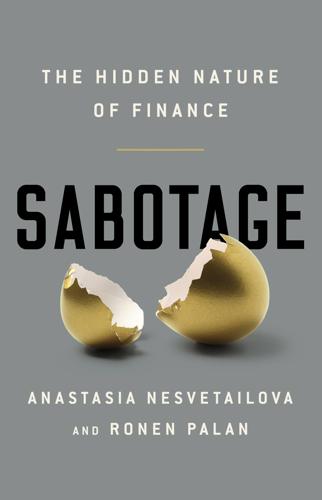
Sabotage: The Financial System's Nasty Business
by
Anastasia Nesvetailova
and
Ronen Palan
Published 28 Jan 2020
So [sabotage] has come to describe any manoeuvre of slowing-down, inefficiency, bungling, obstruction.’2 By the late nineteenth century the meaning of sabotage was used more widely in American popular parlance: to cover all such peaceable or surreptitious manoeuvres of delay, obstruction, friction, and defeat, whether employed by the workmen to enforce their claims, or by the employers to defeat their employees, or by competitive business concerns to get the better of their business rivals or to secure their own advantage.3 Veblen believed that in this expanded meaning the term ‘sabotage’ captured an important dimension of modern business. Thorstein Veblen is a controversial figure in the history of economic thought. His writing style is archaic, quite convoluted and always political. His legacy is mostly associated with The Theory of the Leisure Class, a critique of consumerism and social divisions in capitalism which he published in 1899. Today, Veblen’s theories are rarely taught in university programmes; global search engines yield many more results for ‘John Maynard Keynes’ and ‘John Commons’ than they do for ‘Thorstein Veblen’. Yet in the wake of the 2007–9 crisis, and in light of the revelations of the Panama and Paradise dossiers and the like, one unavoidably begins to ponder whether Veblen’s theory of sabotage is relevant for making sense of the many apparent crises in the capitalist organization.
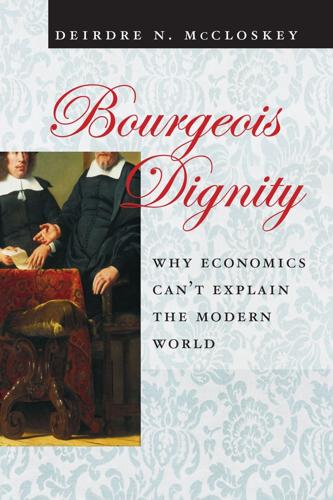
Bourgeois Dignity: Why Economics Can't Explain the Modern World
by
Deirdre N. McCloskey
Published 15 Nov 2011
Stigler, 181; sweatshops, 572 Frost, Robert: between teaching and farming, 33, 63, 577; trade test, 145 Fuchs, R. H.: Dutch painting, 330–332, 335 Fuentes, Yvonne, 675n10 Fulton, Robert: monopoly, 40, 176 Fussell, G. E.: Loder’s calculations, 679n20 Fuzhi, Wang: Confucian, 476 Galbraith, John Kenneth: countervailing power, 175, 304; critique of consumerism, 610 Galilei, Galileo, 419 Galileo (Brecht), 582 Gallagher, Catherine, 595 Gallego, Francisco: human capital as cause, 662n7 Galor, Oded: early growth, 15 Gandhi, Mahatma: betterment, 55 Ganges Plain: Moghul income, 11 Gann, David, 685n23, 55 García Garrosa, Maria Jesus, 675n10 Gardiner, Luke, 447 Gardner, Roy, 652n22 Gary, Indiana: pollution, 68 Gaskell, Mrs., 592 Gates, Bill: creative destruction, 362 Gaus, Gerald: hierarchy and agriculture, 19; hunter-gatherers, 19, 636–637 Gay, John: The Beggar’s Opera, 311 Gay, Paul du.
…
See also wages; wage slavery Lacan, Jacques: rhetoric, 647 Lakoff, George: mental frames, 525 Lal, Deepak: Gregory VII, 410; quotes Nehru, 693n6 Landes, David: culture, 509; culture and psychology of entrepreneurs, 413, 503, 676n12; domination theory, 89; on entrepreneurship, 691n20; European eyeglasses, 389; meae culpae on method, 120, 593; power and plenty, 91 Lane, Frederic: on Venetian calculation, 679n18 Langford, Paul: English charity, 341; polite and commercial people, 258 language game: Skinner and intellectual history, 207 language in economy, 123, 421, 524, chaps. 25–26, chap. 51; Marxist theory of, 359 Lapore, Jill: ideas in history, 516 Larkin, Philip: sophistication in art, 680n23 Lasch, Cristopher: critique of consumerism, 610 Laski, Harold, 501, 625 Lattimore, Owen: Central Asian raiders, 656n22 Lauck, Jon K.: Midwestern towns, 672n23 Lavocat, Françoise: on Japanese poet, 676n18 Lavoie, Don: Austrian economics, 360 Lawrence, Bishop William: Jesus as prudent, 380 Lawrence, D. H.: anti-Americanism, 212; bourgeoisie, 217, 594; Franklin, 211–212, 217, 599; sincerity, 216; translates Verga novel, 673n28 Lawrence, Robert Z.: wages flat, 658n15 Lazonick, William: bosses, 701n5 Lebensraum, 91 Lebergott, Stanley: American bourgeois deal, 135 Le Bris, David: French common law, 416 Lees, Lynn H.: sizes of cities, 679n7 Le Faye, Deirdre: quotes Austen, 667n5 left wing of politics: high wages and betterment, xxvii; Romantic ideas in nineteenth century, xviii Le Goff, Jacques: medieval trading, 449 Le Guin, Ursula K.: progress, 31 Leibniz, Gottfried, 174 Lemert, Charles: sociological imagination, 575 Lenin, Vladimir: cultural contradictions of capitalism, 540 Leon, Donna: washing machines, 23–24 Leonard, Thomas C.: minimum wage, 605 Leonardo da Vinci: originality, 473; reception, 474; secrecy, xxxiv Leoni, Bruno, 651n8; job protection, 206; legal positivism, 137; socialism, xviii Leopardi, Giacomo: wickedness, 185 Leo XIII, Pope, 512 Lepenies, Phillip, 655n7; GDP measures, 654n6; perspective in the Renaissance, 653n45; on Townsend, 655n1, 655n4 Lepenies, Wolf: Kultur, 664n11 Le Roy Ladurie, Emmanuel: medieval riches, 441 Letwin, William: quoted by Kindleberger, 677n20 Levi, Carlo: villages in 1930s, 10; women and water, 27 Levine, Alan: acknowledged, xxxviii Levine, David K.: patent on railway, 668n8; patents, 133, 465 Levy, David: analytic egalitarianism, 653n37, 670n13, 670n21, 699n6; Smith on social engineering, 190; Soviet overtaking, 699n12 Lewis, Frank: property in beavers, 116, 652n16 Lewis, Sinclair, 591; consumerism, 610 Li, Bozhong: comparison of Netherlands and Yangtze, 11 liberalism: and Great Enrichment, xiii, xv, xxxiii; Rorty on, 701n8; as Scottish equality, xxix, xxxi–xxxiii, 39, 409, 643 liberalization: in China and India, 75; and earlier economics, 121; effect on the poor, 73 Liberal Party, British, 509 Liberals, American High: claims of rich, xxix Liberia: poverty, 6, 74 libertarianism, bleeding-heart: fatherly, 559; the poor, 73 liberty and dignity: absent in China in Smith’s day, 206; as against national power, 90; for bourgeoisie, 304; of commoners, xi; counterfactual of, in India, China, Japan, 534; dark side, 404; and expansion of science, 85; in India, 72; leads to selection of memes, 472, 522; Mokyr’s doubts concerning, 408–409; in northwestern Europe, 133; obstacles to accepting, 135; oomph of market failures compared with, 609; as Scottish equality, xxix, xxxi–xxxiii, 39; source of betterment, 21, 39–40, 78, 102, chap. 42, 112, 206, 401, 409, 473, 531; unpredictable results, 130, 60, 400.
…
See also Max U, or prudence only Sandberg, Lars: Swedish poverty, 656n11 Sandvik, Pal, 665n10 Sartre, Jean-Paul: and bourgeoisie, xvii; on inauthenicity, 573 Saunders, Peter: Australian poverty, 46, 51 Sawyer, Peter, 689n17 Say, Jean-Baptiste: imperialism, 89 Sbracia, Massimo: stagnationism, 64 Schama, Simon: Dutch spirit, 329, 334 Schettino, Capt. Francesco, 624 Schlesinger, Stephen: United Fruit, 661n16 Schmidtz, David: trade and liberty, 562 Schneider, Anna: temple theory of Mesopotamia, 549 Schoeck, Helmut: entrepreneurship, 471 Schor, Juliet: critique of consumerism, 610 Schramm, Carl, 510 Schuchardt, Beatrice: on Spanish editions of The London Merchant, 675n10 Schumpeter, Joseph Alois: and Austrian economics, 646; capitalist achievement, 37; causes of betterment, 105; contrast with Smithian growth, 205; creative destruction, 618; critique of Smith, 207; cultural contradictions of capitalism, 540; dueling, 224; entry of new men, 40–41; ideology, 514; materialism, 643; for Smith and against Stupidity, 205–206; usage of “innovation,” 468; vested interests, 396.
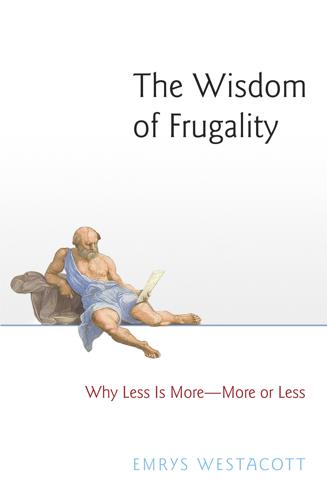
The Wisdom of Frugality: Why Less Is More - More or Less
by
Emrys Westacott
Published 14 Apr 2016
Most books and articles about frugality and simple living are polemical: their aim is both to criticize materialistic beliefs, values, and practices and to advocate an alternative way of thinking and being. Although I am decidedly sympathetic to the outlook they recommend (and my family can vouch for my being certifiably tightwadish), this book is not a polemic. Readers expecting a searing critique of consumerism will be disappointed. Although in places, particularly in the final two chapters, I defend some of the tenets of the “philosophy of frugality” against possible criticisms, the purpose of the work is not to tell the reader: You must change your life! Rather, the book is a philosophical essay, an extended reflection on a set of questions relating to the notions of frugality and simplicity, a reflection that begins by referencing certain strains in the history of ideas in order to elucidate issues and to provide a springboard for discussing whether the wisdom of the past still holds today.
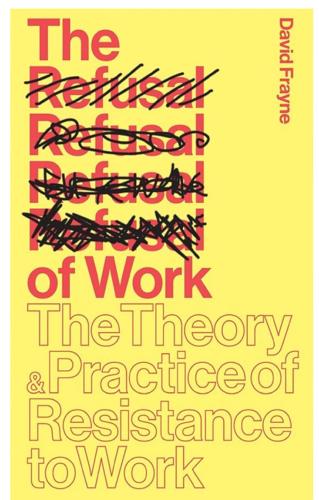
The Refusal of Work: The Theory and Practice of Resistance to Work
by
David Frayne
Published 15 Nov 2015
In her view, consumerism corresponds with a society and a mode of living that has, in various ways, become self-denying and moribund.4 It is to these experiences of disaffection with affluent society that Soper believes an anti-consumerist ethics and politics should appeal: for the best chances of success, countervailing voices should appeal ‘not only to altruistic compassion and environmental concern but also to the more self-regarding gratifications of consuming differently’ (Soper, 2008: 571). To fellow authors, her call is not for a convoluted critique of consumerism based on developing an apparently higher knowledge of what people ‘really’ need (something other than what they ‘think’ they need), but for a more grounded look at what people are themselves saying about the displeasures of modern consumerism. The hope is that such an enquiry might help to nourish the desire for social change, and it is with Soper’s ‘alternative hedonist’ agenda in mind that I propose to explore the frustrations that might prompt people to question a commodity-intensive mode of life.
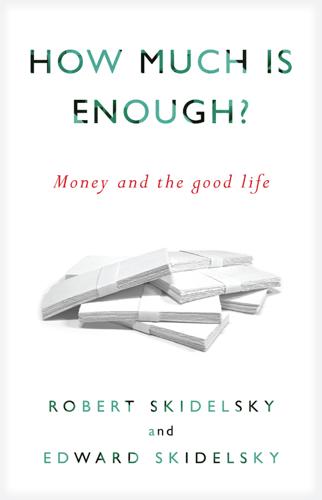
How Much Is Enough?: Money and the Good Life
by
Robert Skidelsky
and
Edward Skidelsky
Published 18 Jun 2012
The Marxist tradition, with its Hegelian roots, has a sharper sense for the dynamic, relational character of human wants—or “needs,” as they are usually called. “A need,” wrote Hegel, “is … created not so much by those who experience it directly as by those who seek to profit from its emergence.”43 This thought became the basis of Marcuse’s critique of consumerism, examined in Chapter 2, and also of J. K. Galbraith’s The New Industrial State (1967), which argued that producers, not consumers, initiate the production process, conditioning the needs of consumers to what they produce. Stanley Resor, president of the largest advertising agency in the United States in the 1950s, agreed.
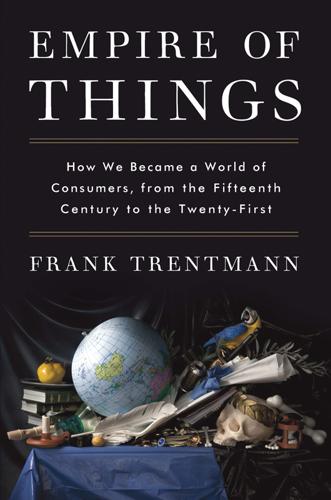
Empire of Things: How We Became a World of Consumers, From the Fifteenth Century to the Twenty-First
by
Frank Trentmann
Published 1 Dec 2015
More interesting is to explore how such thinking travels in the furrows ploughed by earlier thinkers. The critique of consumerism as a new fascism goes back to the 1960s, to Pier Paolo Pasolini, the Italian film director and writer, and the Marxist émigré Herbert Marcuse. Marcuse warned of the coming of a One-dimensional Man, a book that became a best-selling consumer article in its own right. While Marcuse’s pessimistic diagnosis of social control and repression may have gone out of fashion, a good deal of today’s public debate continues to take its lead from the critique of consumerism that flourished during the post-war boom. No single book has cast as long a shadow as John K.
…
By revealing the diversity and dynamics of change, historical knowledge also enables us to look with fresh eyes at what today can appear to be normal, natural and immutable – for what is normal today was not so in the past and, inversely, a lot of what appeared normal to previous cultures would strike us as abnormal today. A historical perspective is therefore essential if we want to understand the surge of consumption and its underlying causes, and the first step before we can evaluate what are more or less promising remedies. In recent discourse, the critique of ‘consumerism’ has, notably, come in two guises. For the first, the root of the problem is a social and moral failure: people want constantly more than they really need, egged on by brands, advertisers and corporations and by their own desire to show off and emulate their superiors. The second sees ‘consumerism’ as part of a larger obsession with economic growth that triumphed after the Second World War.1 Liberate rich societies from the gospel of growth and switch to ‘zero growth’, and the unsustainable surge of material goods will come to a stop.
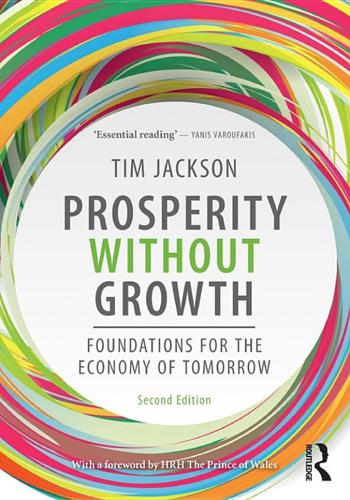
Prosperity Without Growth: Foundations for the Economy of Tomorrow
by
Tim Jackson
Published 8 Dec 2016
In the wake of the first edition, I received such widespread support from so many colleagues and friends that it would be impossible to make mention of them all here. People contacted me from the most unlikely places, and the warmth of their reception remains a vital resource for me in setting this work in perspective From the hospice manager who drew parallels between my critique of consumerism and the challenge of those entering his care, to the Augustinian sister who wrote to me about Thomas Aquinas’ views on the common good; from the economics professor who thanked me for breaking a taboo he had never understood to the grandmother who in the 1960s already brought up her children in accordance with the principles of ‘living lightly’ on the earth; from the school kids and university students who invited me to give lectures to the investment managers who were prepared to listen and change: these personal responses probably meant more to me than the many thousands of academic pages devoted to analysing and critiquing the limits of ‘decoupling’.
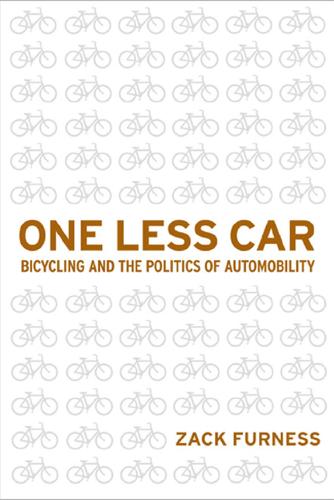
One Less Car: Bicycling and the Politics of Automobility
by
Zack Furness
and
Zachary Mooradian Furness
Published 28 Mar 2010
Bike riding punks, zinesters, tinkerers, and mutant bike clubs are part of an “outlaw bike subculture” that contests the ideological and material norms of automobility as well as the prevailing wisdom, practices, and behaviors promoted by mainstream bike culture. They contextualize the bicycle as part of a radical critique of consumerism and embrace a Diy paradigm that is less escapist than it is a “life experiment, a form of resistance, and a way, a form of ‘making do.’”76 Bike riding and junk tinkering are in this sense just as informed by environmental ethics and a critique of auto and oil industries as they are a basic longing for community and/or a desire to live outside the trappings of suburban isolation, yuppie individualism, and a dead-end job that yields little more than the money needed to make monthly car payments—a cycle that illustrator andy Singer poignantly lampoons in his cartoon “Drive to Work, Work to Drive.”